1
You are born and so your gender path begins. Or does it?
You might think that the first question to ask about your gender path is whether youre born a boy or a girl. But the first question comes even before that. Some of the most important factors related to your gender adventure began long before you were born. Youre born into a particular time and place. Your gender path is going to be very different if youre born into one of the hunter-gatherer groups in which humans lived for most of our history than it will be if youre born in the twenty-first-century United States.
Therefore, the first question is: Exactly how do people in the time and place where youre born think about gender? Or an even crazier question: Do people in the time and place where youre born think about gender at all?
 Youre born into a time and place where gender exists..
Youre born into a time and place where gender exists..
 Youre born into a time and place where gender doesnt exist..
Youre born into a time and place where gender doesnt exist..
2
In the society youre born into, gender assignment happens at birth (or sooner). Unless you are a very unusual newborn, you dont have much say in your gender assignment. As a baby, you arent able to disagree with the gender that everyone tells you that you are. Already, choices about your gender path are being made for you.
You also dont get any input into the particular gender categories that are available to you. Maybe two gender categories are just fine with you. Maybe youd prefer three or one. Maybe you dont want any gender at all or maybe an infinite number of gender categories sounds about right to you. Either way, its very hard to suggest alternatives when youve just been born.
All the same, the culture youre born into will have its own way of organizing gender, and those categories are the options that are available for your gender assignment.
 Youre born into a culture with one gender..
Youre born into a culture with one gender..
 Youre born into a culture with two genders..
Youre born into a culture with two genders..
 Youre born into a culture with more than two genders..
Youre born into a culture with more than two genders..
 Youre born into a culture with infinite genders..
Youre born into a culture with infinite genders..
3
Congratulations! Youre an intersex infant! Youre perfectly normal and youre not alone.
The term intersex covers a wide range of reproductive or anatomical variations that dont fit the claims of sexual dimorphism, or the typical definitions of male and female. Some of the variations are anatomical and therefore identified at birth, but many are not.
It may feel a little disorienting at first, not having a pink or blue hat, but being intersex is completely natural. Intersex people like you have always existed. Being an intersex infant isnt the result of any disease or genetic mutation, and its much more common than most people think. Estimates vary because its hard to know for sure who is and isnt intersex, but the frequency of all intersex variations may be as high as 1.7 percent of the global population. So being an intersex person is about as common as being a redhead.
INTERSEX
n . /in-tr-seks/
A person who is intersex does not fit the typical definitions of male and female. Often describes a person who has ambiguous (or both sets) or external genitalia.
Intersex is an umbrella term that covers a wide variety of biological realities. Historically, intersex individuals were called hermaphrodites, a word with Greek origins that implies a combination of man and woman; this older term has been mostly abandoned in favor of intersex. Some intersex people are born with both a penis and a vagina. Others have ambiguous genitaliatheir collection of genital tissue falls in the space between what doctors call a penis or a clitoris.
AMBIGUOUS GENITALIA
n . /am-bi-gy-ws je-n-tl-y/
Genital tissue that falls in the gray space between what doctors call a penis or a clitoris.
Some intersex variations are chromosomal, which means that they are located in your DNAyour genetic blueprint. Sexual dimorphism tells us that one of the real and objective criteria for distinguishing between women and men are their chromosomes. Men are XY and women are XX. But some intersex people are XXO or XXY or XO.
Intersex variations can also involve internal organs. Some intersex people have both an ovary and a testis.
So what happens to you as an intersex newborn? How do doctors and parents treat a baby to whom they cannot immediately assign a gender?
A lot depends on the particular type of intersex variation you have and whether its apparent at birth or not.
 Your intersex variation is apparent at birth..
Your intersex variation is apparent at birth..
 Your intersex variation isnt apparent at birth..
Your intersex variation isnt apparent at birth..
4
Youve been born a hijra in India. Youre neither man nor woman, but one of the many gender-variant categories that exist around the world.
Actually, youre not born a hijra in India. The hijra role is something you become rather than something youre born into. As a hijra in India, you get to have some say in your gender assignment, something you wouldnt get in many other cultures.
In order to understand what it means to be a hijra, you have to understand a little bit about Hinduism, the religious tradition from which the hijra role emerges. Representations of androgyny (the combination of feminine and masculine characteristics) and intersex people (people whose physical bodies dont quite fit into the defined criteria for sorting women and men) are both common in Hindu origin myths. For example, the Rig Veda (a Hindu religious text) says that before creation, the world lacked all distinctions, including those of gender. Men with wombs, a male god with breasts, a pregnant manthese are all common images in ancient Hindu poetry, reflecting this idea of androgyny. Multiple genders are acknowledged among both gods and humans.
To become a hijra, your gender assignment at birth starts as a boy. Later, you receive a spiritual call from the Hindu Mother Goddess, known in one form as Bahuchara Mata. If you ignore her call, you risk being born impotent for the next seven future rebirthsnot at all a good thing in a culture where being able to have children is very important. The call tells you to undergo a gender change, wear your hair long, and dress in womens clothes. To answer the call, you join a house, or a particular lineage or clan of hijras. There you become a chela (disciple) with a guru (master or teacher) who gives you a feminine name and pays your initiation fee into the hijra community.
ANDROGYNY
n . /an-dr-j-n/
The state of being neither specifically masculine nor feminine.
When you become a hijra, you leave behind your masculine identity and take on a feminine one. You dress like a woman and assume a feminine name. You use feminine kinship terms with others in your house, like auntie, sister, and grandmother. On public transportation, you and other hijras request ladies-only seating. But you are not truly a woman. Your feminine dress is often exaggerated and, unlike traditional Hindu women, you exhibit a more aggressive sexuality. Part of the hijra role involves dancing in public on ritual occasions, which is something Hindu women would generally not do.

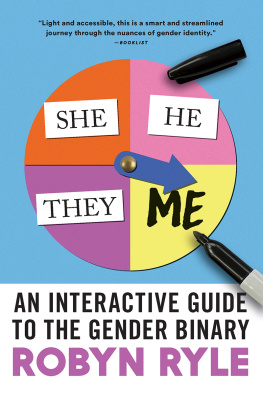

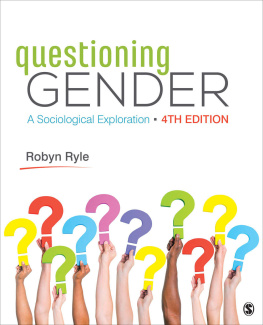
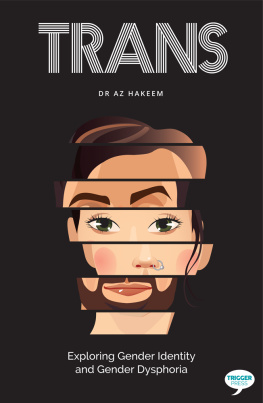




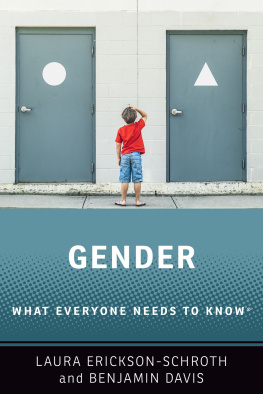
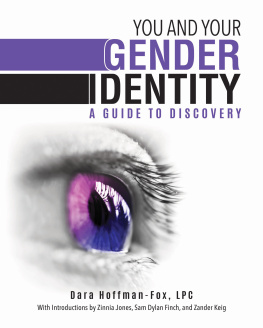
 Youre born into a time and place where gender exists..
Youre born into a time and place where gender exists.. Youre born into a time and place where gender doesnt exist..
Youre born into a time and place where gender doesnt exist.. Youre born into a culture with two genders..
Youre born into a culture with two genders..